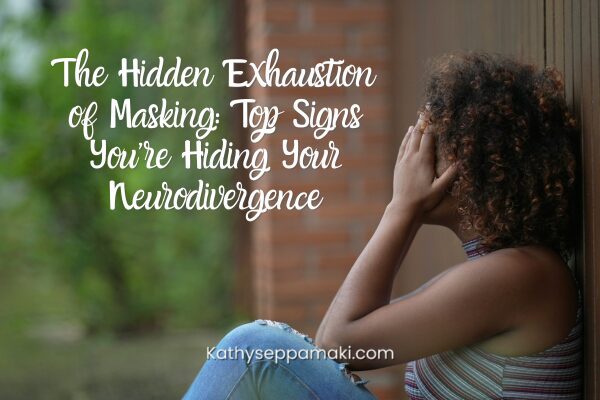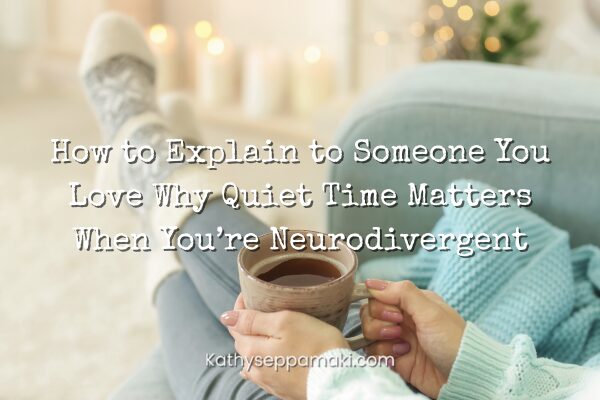We learn early in life how to survive. For many neurodivergent people, those with ADHD, autism, or both, survival often looks like masking.
Masking, also called “camouflaging”, is a survival strategy learned early in life to fit in, avoid judgment, or feel safe in a world that often isn’t designed for neurodivergent brains. It’s the art of blending in, acting “normal,” and trying not to stand out too much.
But masking isn’t harmless. Over time, it chips away at your sense of self, drains your energy, and can lead to deep burnout, anxiety, and even depression. You start to forget who you are underneath the mask…the real, raw, beautiful you.
Top signs that you might be masking as a neurodivergent person
You’re constantly “on guard” in social situations
You spend a lot of energy trying to read the room, watching your tone, facial expressions, and body language, instead of just being in the moment. Later, you might replay conversations, analyzing every word, worrying if you said something wrong. The irony is that being super vigilant in social situations may be so common for you that you don’t even recognize that you are doing it. I certainly didn’t!
You imitate others to fit in
You unconsciously mirror other people’s expressions, interests, or speech patterns because it feels safer that way. You might become a social chameleon, adapting to everyone else but slowly losing touch with who you are.
You script conversations ahead of time
You mentally rehearse what you’ll say before calls, meetings, or social events. When things don’t go as planned, it can feel disorienting or anxiety-inducing. Scripting helps you appear confident, but it can also be utterly exhausting. I catch myself scripting all the time! And so often the situations I script for never even happen. And yet, I’ve spent a good deal of my mental and emotional energy creating that script.
You hide your stims or fidgeting
You may suppress self-soothing behaviors (like tapping, rocking, humming, or playing with your hands) because you’ve been told they’re “weird” or “distracting.” Over time, holding these in can cause physical tension and emotional exhaustion. This could also cause you to pick up a more socially appropriate stim, such as overeating, to help soothe yourself.
This is one of the reasons why my weight has fluctuated significantly throughout the years.
You overanalyze your emotions and expressions
You might constantly monitor your facial expressions or reactions to make sure they seem “appropriate.” For example, forcing a smile, nodding even when you’re confused, or mimicking empathy cues instead of feeling naturally connected.
You need a lot of recovery time after social interactions
After being around people, you feel completely drained and need solitude to recharge, even if you enjoyed yourself. The exhaustion often comes from maintaining the “mask” the whole time.
You suppress your natural interests or passions
You might downplay your special interests, enthusiasm, or “hyperfixations” because you’ve been told they’re too much or not socially acceptable. Over time, this can make you feel disconnected from what truly lights you up.
You feel like you have multiple versions of yourself
You might notice you act differently at work, with friends, or at home. Almost like you’re playing different characters. It can make you wonder, “Who am I really?” This is definitely something I began asking myself in the last few years. Before I even discovered that I am AuDHD, I recognized that I don’t really know myself. And I’ve been doing everything I can to change that!
You experience chronic burnout or emotional numbness
Masking takes a huge toll on your nervous system. Many neurodivergent people reach a point where they feel completely depleted, depressed, or detached, often before they even realize masking is the cause. This is most likely why so many people get sick more often and struggle with chronic illness and unexplained symptoms. Chronic stress is damaging to health, and those who are neurodivergent and either are undiagnosed or who don’t understand how to take care of their body’s needs will struggle the most.
You feel relief when you’re alone or with other neurodivergent people
When you’re finally in an environment where you can unmask, stim freely, speak your mind, move your body naturally, or hyperfocus without shame, you feel an immense sense of peace and authenticity.
Unmasking is healing
Realizing you’ve been masking isn’t something to be ashamed of; it’s something to honor. You did what you needed to survive. Now, you can begin to gently unmask, reconnect with your true self, and build a life that accepts your neurodivergence instead of demanding you hide it.




